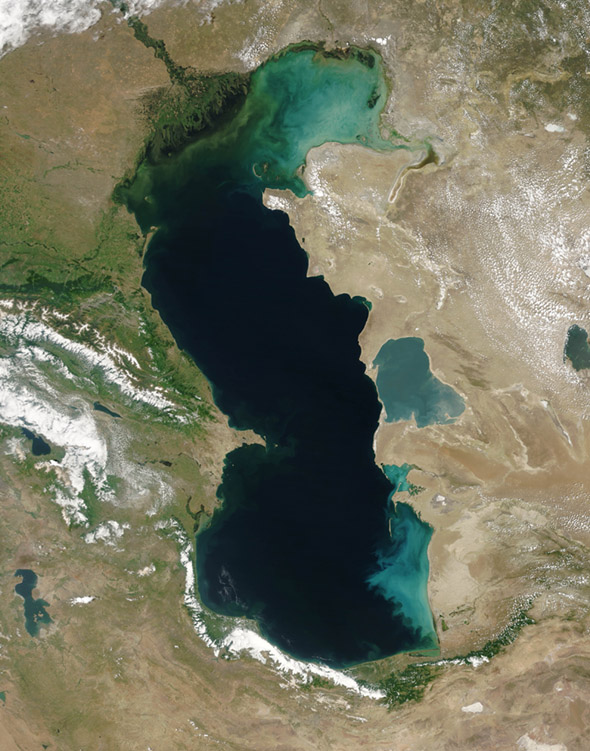Peter Fairlie-Clarke also provided a link to a paper – all the way back to 1907. I know he's knocking on, but … but as you will see it is old hat but relevant to the modern world
 The image to the side is of the Caspian Sea taken from space. It is big – but apparently it has been bigger – on lots of occasions. You can access the paper at www.jstor.org/stable/197794?seq=1#page_sen_tab_contents and it is a nice read as it foretells much of what climate science by the likes of HH Lamb had to say 50 years later. It is not particularly in step with CAGW thinking – the idea the modern warming of the 20th century is something unusual and we should all be afraid.
The image to the side is of the Caspian Sea taken from space. It is big – but apparently it has been bigger – on lots of occasions. You can access the paper at www.jstor.org/stable/197794?seq=1#page_sen_tab_contents and it is a nice read as it foretells much of what climate science by the likes of HH Lamb had to say 50 years later. It is not particularly in step with CAGW thinking – the idea the modern warming of the 20th century is something unusual and we should all be afraid.
Peter's copy was well typed, unlike the link above, but it is the same article as it was published in the Bulletin of the American Geographical Society volume xxxix no. 10 (1907), 'The Historical Fluctuations of the Caspian Sea' by Ellsworth Huntington. He journeyed across central Asia and northern India on a research trip and wrote about his discoveries – and see also his book, 'The Pulse of Asia' (a reprint can be purchased via Amazon for a modest sum). It is basically an extension of his research paper (above) moulded into his now germinated notion that climate affected the course of history – and in this instance was the pulse of Asia. This was no doubt controversial at the time but what he wrote would now be regarded as very likely. His theory is that Asiatic lakes and river flow, including the Caspian Sea, Lake Van and the Aral Sea are fed by rivers and rivers flow more strongly when the weather is wet – lots of rain. Lake levels rise in wet periods and decline in arid periods. It was not as simple as that but it is the dates he applied to the rise in lake levels that catches the eye – as they correspond exactly with warm periods (decline in levels) and cool and wet phases of climate (rise in lake levels). For example, the Caspian Sea was more or less roughly at todays level during the Roman Warm Period – but levels rose dramatically between 300-800AD. Lakes in Armenia followed a similar pattern. The same change in climate (wet and dry) was true of Persia, Sinkiang, and Kashmir, in the east, and what is today Turkey in the west. He claims a drainage basin 3000 miles from E to W and 1000 miles N to S was affected by the pulse of wet and dry cycles. In the Roman period (or early Christian era as he calls it) the lakes and rivers were reduced. Old lake beds were built on and villages sprang up where the water had ebbed away – the lake bed providing nutrients for farmers. Oases were abandoned due to lack of water – and people moved elsewhere. In this way he is able to make sense of historical references to the Caspian – by the likes of Herodotus and Aristotle, and so on.
It is somewhat surprising to find evidence of wetter conditions in central Asia at the same time as wetter and cooler conditions prevailed in Britain and Ireland (and NW Europe in general). Our climate is supposed to be dictated by low pressure systems crossing the Atlantic from SE N America – but why should continental climate thousands of miles away draw such a close parallel? Presumably it involved the position of the jet stream across northern Asia, moving to the south during the fluvial episodes (as a result of a cool global climate). A few years ago we heard a lot of hype about declining levels of the Caspian and Aral seas – but not a lot has been said of late. It will be interesting to keep a watch on this aspect of climate change – which is all about warming and drying (and not about wetter and cooler).
In the medieval warm period the Caspian Sea level was lower – not too different from the modern world. In the Middle Ages (which included the Little Ice Age) levels rose dramatically – well above what they are today. When the Little Ice Age came to an end lake levels began to fall once again.
This is climate science – 1907 vintage. Such observations are of course ignored by the CAGW lobby. Common sense and field research is not part of their alarmism. Huntington became a professor of geography at Yale University but not everything he wrote would be politically correct nowadays. The thought police would be on his back in no time. However, he thought that climate change had altered the course of history and now we know it did. What we don't know is what caused the climate to change in first place – although lots of people think they know. In that respect Huntington was something of a trail blazer. See for example http://novaonline.nvcc.edu/eli/evans/his241/notes/geography/caspian.html … and see also the wiki entry on Huntington (for a biography). See also https://archive.org/details/pulseofasiajourn00huntuoft click to turn the pages
